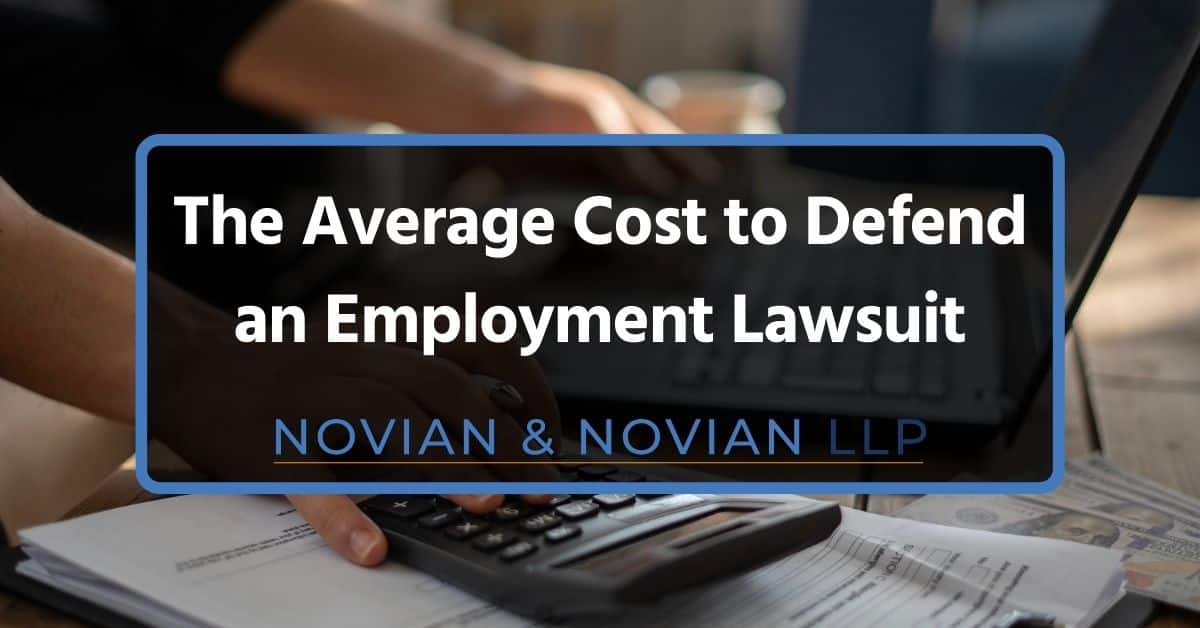
Aby | Mar 5, 2024 | Employment Law
The average cost for employers to defend an employment lawsuit can vary significantly depending on whether the case settles or goes to trial. On average, it costs employers around $75,000 to work with an employment lawyer to settle a claim before it reaches trial. However, if the case progresses to court, the expenses can skyrocket, with pre-trial defense costs easily exceeding $125,000. Given the potential costs and the complexity of employment lawsuits, it’s crucial for businesses to seek competent legal representation for employment law issues.
If you find yourself needing assistance in navigating employment law, reach out to us at Novian & Novian. With over 35 years of experience, we have consistently delivered first-tier legal services, rooted in understanding clients’ intricate business needs and personal concerns. We have some of the best attorneys in California to help you with guidance and representation.
This post will provide you with a comprehensive breakdown of the costs involved in defending employment lawsuits. By understanding these expenses, along with the value of experienced legal representation, employers can make more informed decisions when faced with employment disputes.
Factors Influencing the Cost of Employment Defense
There has been a rising trend in employment lawsuits recently, posing a significant challenge for employers. This surge can be attributed to several factors, including increased awareness among employees of their legal rights, changes in employment laws, and a growing willingness to challenge perceived injustices in the workplace. Such lawsuits can cover a wide range of employment issues, from wrongful termination and discrimination to harassment and breach of contract.
The cost of defending employment lawsuits can be influenced by the complexity of the case. More complex proceedings require more time and resources to understand and defend effectively. Likewise, complex legal issues or large amounts of documentation can increase costs.
The duration of the lawsuit also plays a role as longer lawsuits accumulate more hours of legal work, increasing costs. The longer a case drags on, the more expenses are incurred in attorney fees, court costs, and other related expenses.
Legal fees and court costs can vary significantly by jurisdiction. High-cost areas may lead to higher overall defense costs due to increased rates for legal services.
The employment attorney you choose can also determine cost as experienced employment attorneys often charge higher rates. Billing practices, such as hourly rates vs. flat fees, also affect total costs.
Legal Fees
Legal fees in employment lawsuits vary based on the specifics of each case, the location, and the law firm or attorney involved. The primary types of legal fees for an employment lawyer cost include retainer fees, hourly rates, and flat fees.
A retainer fee is the upfront cost to secure the services of an employment attorney. It is best viewed as a down payment which the employment lawyer deducts hourly charges as they accrue. A retainer fee is common in complex cases where the legal work is extensive and prolonged.
Many employment attorneys charge by the hour for employment lawsuits which is where hourly rates come in. The hourly rate for defending employment lawsuits can range widely, often from $150 to $1000 per hour or more. The cost hinges on the experience of the employment lawyer, the law firm’s prestige, and the geographic location of the employment case.
However, some employment lawyers may offer flat fees for their specific services. This is less common in employment lawsuits due to the unpredictable nature of these cases. Flat fees are more suitable for straightforward tasks with a predictable amount of work.
Court Costs and Other Expenses
Beyond legal fees, an employment lawyer defending against an employment lawsuit incurs various court costs and other expenses that can add significantly to the total cost. Filing fees are an example of such extra cost. These are the fees charged by the court to file legal documents related to your employment case. Filing fees can vary depending on the court and the type of document being filed. But generally, it ranges from $100 to several hundred dollars.
There are also some costs associated with discovery. The discovery process can be one of the most expensive aspects of a lawsuit. It involves the exchange of documents, depositions, and other evidence between parties.
Depositions require hiring a court reporter and possibly renting a space to conduct the deposition. Such costs potentially run into thousands of dollars depending on the length and number of depositions. There is also document production which can be expensive, especially in employment cases requiring extensive electronic discovery (e-discovery), which involves searching, collecting, and producing electronically stored information. Costs can escalate quickly based on the volume of data and the need for specialized software or services to process it.
You may also need to pay expert witness fees. Expert witnesses are those who provide specialized knowledge relevant to the case. They can command high fees for their services, including preparation, reports, and testimony. Fees usually range from a few thousand to tens of thousands of dollars, depending on the expert’s field and the complexity of the case.
In addition, you should expect miscellaneous expenses which can include travel costs for attorneys and witnesses, copying and printing expenses, and other small items. While individually these may not be as significant as other costs, collectively, they can add up to a considerable amount.
What is The Most a Person Can Sue for Wrongful Termination?

Employment lawsuits in the U.S. are governed by a combination of federal agency laws and state laws. Key federal laws include Title VII of the Civil Rights Act of 1964, The Americans with Disabilities Act (ADA), The Age Discrimination in Employment Act (ADEA), The Equal Pay Act (EPA), and The Family and Medical Leave Act (FMLA). In addition, state laws can provide additional protections and remedies beyond those available under federal law.
Statistics surrounding EEOC claims indicate a notable prevalence of employment lawsuits in the U.S.. The Equal Employment Opportunity Commission (EEOC) receives tens of thousands of complaints annually. The outcomes of these lawsuits vary widely, with some resulting in significant settlements or verdicts in favor of the plaintiffs, while others may be dismissed or result in favorable outcomes for the defendants.
There are no hard caps on damages in federal employment law cases, though some state laws may impose limits, especially on punitive damages. The most a person can sue for wrongful termination or any other employment dispute depends on the specific damages they have suffered, which may include lost wages, emotional distress, punitive damages (in cases of egregious employer misconduct), and attorneys’ fees.
Most employment lawsuits arise when an employee believes they have been fired or laid off from their job for illegal or unfair reasons. It could hinge on workplace discrimination, wrongful termination, harassment, retaliation, etc. Settlement amounts in these lawsuits vary widely based on the case’s specifics.
Wrongful termination settlements often range from $5,000 to $100,000, but can exceed this if the case involves significant damages or egregious conduct by the employer. Furthermore, harassment cases vary significantly, with settlements depending on the severity and duration of the harassment.
You can either settle or opt to go to trial with an employment lawyer by your side. Settling is less costly than a trial with less public exposure and quicker resolution.
Strategies to Mitigate Costs
To mitigate the costs associated with defending against employment lawsuits, you should engage an employment lawyer as soon as you can. This way, you have an early and clear assessment of the case.
It is also helpful to sometimes consider an early resolution. Sometimes, it is always best to settle out of court. This way, you do not have to deal with the costs associated with employment lawsuits.
As an employer, you should also consider investing in Employment Practices Liability Insurance (EPLI). It covers a business against claims by employees that their legal rights as employees of the company have been violated. While there are premiums and deductibles to consider, EPLI can provide valuable financial protection against the cost of lawsuits.
Importantly, you should choose the right legal representation. Selecting an employment attorney or law firm with experience in employment law and a track record of resolving cases efficiently can make a significant difference. Experienced employment attorneys who understand your business and can offer strategic advice tailored to your specific situation can help manage costs effectively.
What is the Best Employer Defense Approach in a Discrimination Case?
In an employment claim like discrimination lawsuits, the best defense for an employer often revolves around a multi-faceted approach that includes comprehensive documentation, effective policies, and proactive measures. In these cases, the employee must initially show evidence of discrimination. The employer then has the opportunity to present a legitimate, non-discriminatory reason for the alleged discriminatory action.
Having detailed records and clear policies are crucial. This includes negotiating and drafting employment agreements that outline expectations and standards. Proper documentation of all employment actions (hiring, promotions, disciplinary actions, etc.) provides evidence that decisions were based on legitimate business needs, not discrimination.
Regular training for management and staff on discrimination laws and company policies also helps prevent discriminatory practices. Ensuring all employees understand how to report discrimination and how those reports are handled is vital. In addition, guidance on how to write up an employee correctly can help maintain consistent and fair disciplinary practices.
Keep in mind that employers must show that their actions are fair, consistent across all employees, and in compliance with employment laws. This includes equal application of all policies and procedures for all.
Contact Novian & Novian For Help Defending Your Employment Lawsuit
The importance of being proactive cannot be overstated for employers. It helps in defending against potential lawsuits and also in maintaining a positive workplace environment. Furthermore, engaging in an employment law consultation early, can equip employers with the necessary tools and knowledge to navigate the legal landscape effectively.
To reduce the costs of defending against employment lawsuits, you should take strategic measures as mentioned above to manage and even reduce these expenses. For employers looking to navigate these challenges with confidence, reach out to us at Novian & Novian! Our expertise can help safeguard your business against potential legal issues and ensure compliance with complex employment regulations.
Contact Us
Have questions about this post? Novian & Novian is a full service law firm in Los Angeles with clients that span the country. Contact us today for a free consultation.
Contact Us
Have questions about this post? Novian & Novian is a full service law firm in Los Angeles with clients that span the country. Contact us today for a free consultation.




